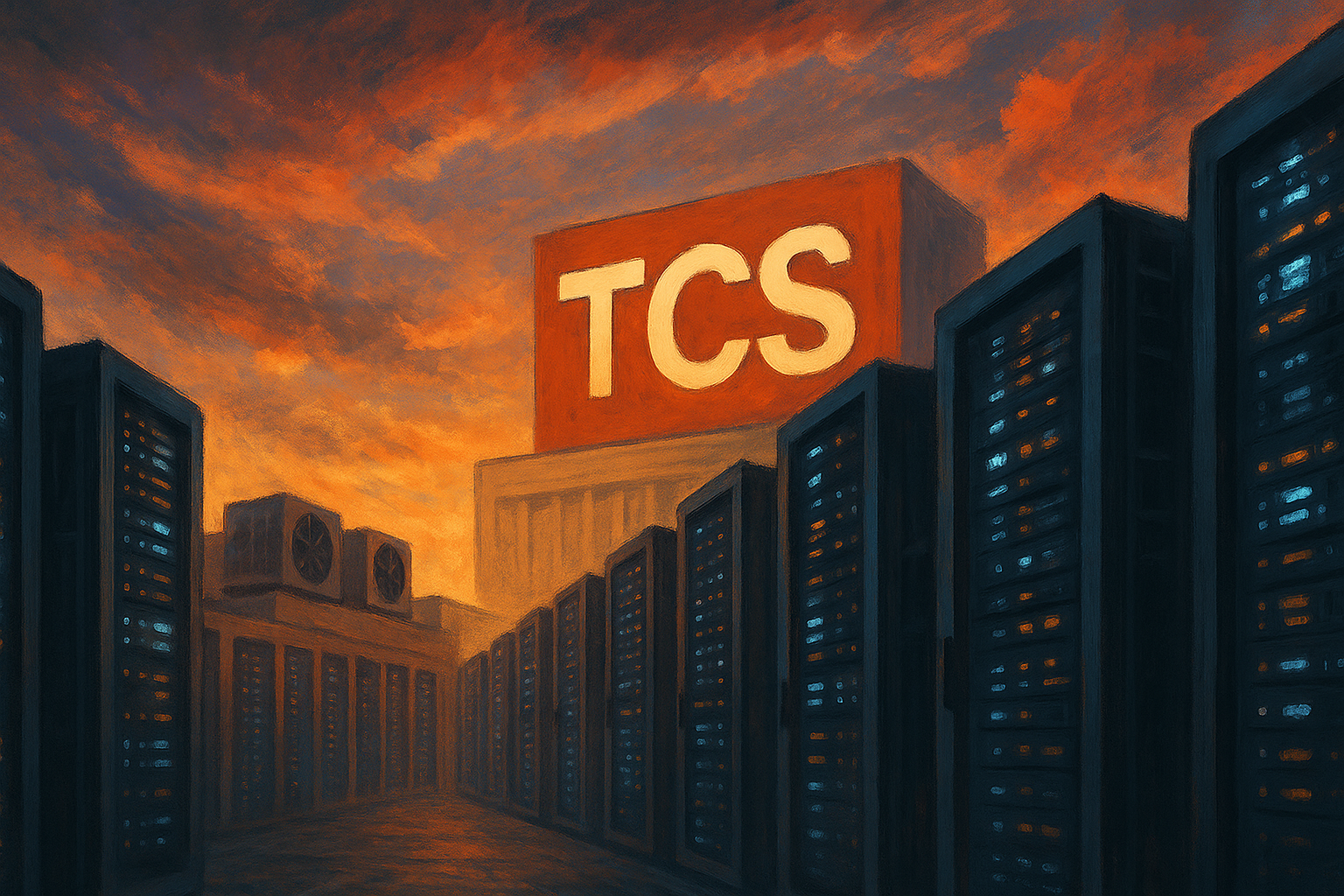Tata Consultancy Services (TCS), India’s largest IT services company, is charting a new course in its growth story. In an ambitious $6.5-billion plan, the tech giant has announced its foray into data centres, an area increasingly critical for the artificial intelligence (AI) revolution. However, TCS management has acknowledged that this shift could come with slimmer profit margins than its traditional IT services business.
A New Chapter: The HyperVault AI Data Centre Initiative
On 9 October, TCS unveiled its vision to establish a 1GW AI data centre ecosystem in India through a new business unit named HyperVault AI Data Centre Ltd. The project will unfold over seven years, involving phased investments totaling $6.5 billion. These facilities will house high-density data racks — some ranging from 50KW to 370KW per rack — requiring advanced cooling systems, including liquid-based technology to manage heat from extensive AI-driven workloads.
The company plans to anchor these data centres in key urban hubs like Navi Mumbai, Hyderabad, Bangalore, New Delhi, and Pune, collectively responsible for over 80% of India’s data centre capacity. The goal: complete each project phase within an 18-month construction cycle, once land is secured.
The Profitability Puzzle
While the move represents a strategic pivot into the AI infrastructure ecosystem, TCS Chief Financial Officer Samir Seksaria has been transparent about its financial implications. “Yes, it won’t get the same RoEs (return on equity) as you would expect from the TCS business, but we are confident we’ll be able to maintain industry-leading return ratios,” Seksaria stated during a conversation with Kotak Institutional Equities.
TCS’s IT services have long been an asset-light model—a structure that delivers impressive RoEs of around 50%. In contrast, the data centre business is asset-heavy, involving substantial capital expenditure on land, servers, and energy infrastructure. Analysts from ICICI Securities forecast that this could drag TCS’s overall RoE down to around 40% in the next five years.
Still, Seksaria reassured investors that the company’s strong balance sheet would prevent any major strain on returns. The investments, he said, would be staggered and possibly supported by external funding, though he did not disclose the proportion of outside capital TCS intends to raise.
Investor Caution and Analyst Concerns
Despite management’s confidence, market reactions have been tepid. Since the announcement, TCS’s stock has dipped 0.14%, trailing the broader Sensex’s 2.15% rise. Meanwhile, peers like HCLTech have gained over 3%, indicating investor preference for more immediate, high-margin ventures.
Analysts have described the move as “less than exciting.” Amit Chandra of HDFC Securities remarked that investors would have preferred TCS channel its cash reserves into “cutting-edge AI investments” rather than capital-intensive infrastructure. Similarly, Pramod Gubbi of Marcellus Investment Managers suggested that shareholders might rather see TCS return excess cash or deepen its expertise in IT services—areas where it already holds global leadership.
The Strategic Rationale: One Tata, Many Synergies
TCS’s data centre push also aligns with the “One Tata” strategy, which aims to unlock synergies across the conglomerate’s vast ecosystem. The company is expected to collaborate with Tata Communications, Tata Power Renewable Energy, and other group firms for power, connectivity, and infrastructure.
Deepesh Nanda, CEO of Tata Power Renewable Energy, highlighted that the company could provide renewable power at competitive rates—a crucial cost advantage in energy-intensive data centres.
The demand outlook is equally compelling. With hyperscalers and AI startups driving exponential data consumption, India’s colocation capacity, currently at 1.35GW, is projected by JM Financial to quadruple by 2030. This growth, the analysts note, could elevate India’s data centre density closer to global benchmarks like China’s.
Balancing Growth and Returns
The challenge for TCS will be balancing short-term return pressures against long-term strategic positioning. As AI reshapes enterprise technology, owning the underlying infrastructure could give TCS a competitive edge in servicing cloud and AI clients. Yet, investors remain cautious—skeptical about whether this capital-heavy diversification will deliver the kind of profitability that made TCS a blue-chip stalwart.
Conclusion: Calculated Risk or Strategic Overreach?
TCS’s entry into the data centre business marks one of the company’s boldest moves since its inception. The initiative underscores a recognition that AI and data infrastructure are the future of digital enterprise, even if they demand a different financial playbook. While the immediate returns may not dazzle, TCS’s calculated risk could redefine its role—from being a pure IT services provider to an integrated AI ecosystem enabler.
Ultimately, the question is not whether TCS can afford this gamble—it can—but whether investors can afford to wait for it to pay off.
Feel free to share your experiences and insights in the comments below. Let’s continue the conversation and grow together as a community of traders and analysts.
By sharing this experience and insights, I hope to contribute to the collective knowledge of our professional community, encouraging a culture of strategic thinking and informed decision-making.
As always, thorough research and risk management are crucial. The dynamic nature of financial markets demands vigilance, agility, and a deep understanding of the tools at your disposal. Here’s to profitable trading and navigating the election season with confidence!
Ready to stay ahead of market trends and make informed investment decisions? Follow our page for more insights and updates on the latest in the financial world!
For a free online stock market training by Yogeshwar Vashishtha (M.Tech IIT) this Saturday from 11 am – 1 pm, please sign up with https://pathfinderstrainings.in/training/freetrainings.aspx
Experience profits with my winning algo strategies – get a free one-month trial with ₹15 lakh capital! – https://terminal.algofinders.com/algo-terminal
Disclaimer
This article should not be interpreted as investment advice. For any investment decisions, consult a reputable financial advisor. The author and publisher are not responsible for any losses incurred by investors or traders based on the information provided.


